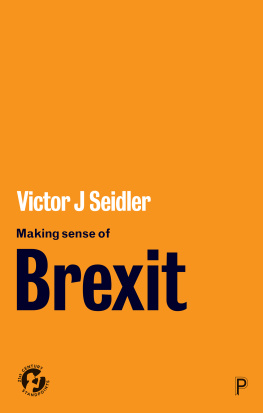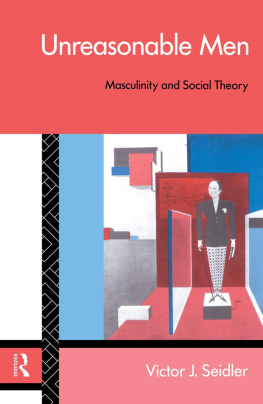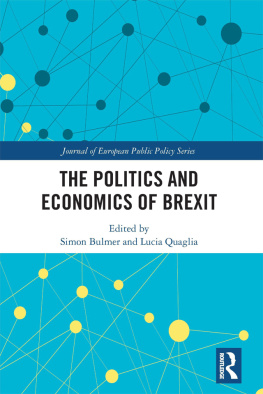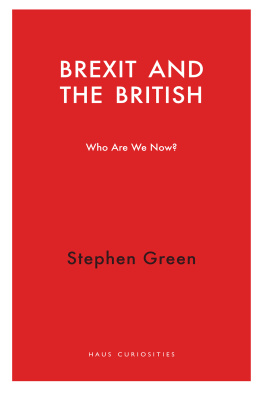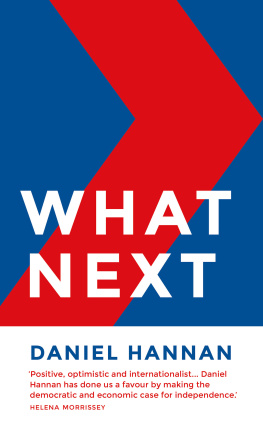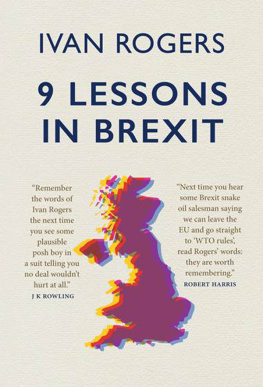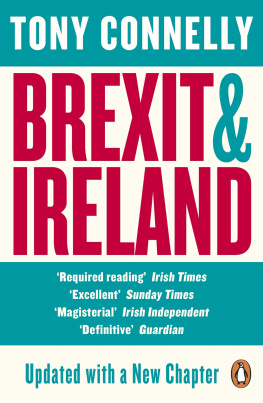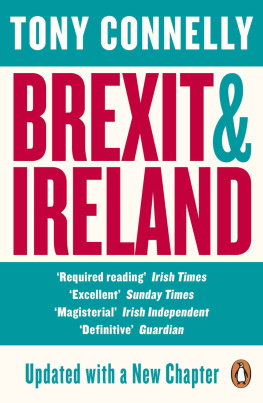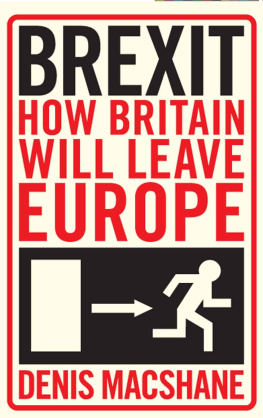First published in Great Britain in 2018 by
Policy Press University of Bristol 1-9 Old Park Hill Bristol BS2 8BB UK Tel +44 (0)117 954 5940 e-mail
North American office: Policy Press c/o The University of Chicago Press 1427 East 60th Street Chicago, IL 60637, USA t: +1 773 702 7700 f: +1 773-702-9756 e:
Policy Press 2018
British Library Cataloguing in Publication Data
A catalogue record for this book is available from the British Library.
Library of Congress Cataloging-in-Publication Data
A catalog record for this book has been requested.
ISBN 978-1-4473-4520-6 paperback
ISBN 978-1-4473-4522-0 ePub
ISBN 978-1-4473-4523-7 Mobi
ISBN 978-1-4473-4521-3 ePdf
The right of Victor Jeleniewski Seidler to be identified as author of this work has been asserted by him in accordance with the Copyright, Designs and Patents Act 1988.
All rights reserved: no part of this publication may be reproduced, stored in a retrieval system, or transmitted in any form or by any means, electronic, mechanical, photocopying, recording, or otherwise without the prior permission of Policy Press.
The statements and opinions contained within this publication are solely those of the author and not of the University of Bristol or Policy Press. The University of Bristol and Policy Press disclaim responsibility for any injury to persons or property resulting from any material published in this publication.
Policy Press works to counter discrimination on grounds of gender, race, disability, age and sexuality.
Cover design by Lyn Davies
Readers Guide
This book has been optimised for PDA.
Tables may have been presented to accommodate this devices limitations.
Image presentation is limited by this devices limitations.
In Making Sense of Brexit Seidler persistently urges us to suspend our assumptions and genuinely attend to the diversity of voices of anger and hope responding to neoliberal capitalisms injustices. Seidler cogently highlights the potential of a politics of voice, and crucially, the urgency of the ethical project of listening.
Shani Orgad, London School of Economics and Political Science
Seidler has done a terrific job at surveying the process and impact of Brexit. He has mined some of the best journalism from the time and then applied his own uniquely prescient analysis of the social and emotional forces that have been unleashed.
Andrew Bethell, International Educational Media Consultant
Vic Seidler offers insight into a wide range of issues from gender to immigration, class to the emotional side of politics. His book will remain valuable for years to come as the country struggles to understand just what is happening.
Craig Calhoun, Berggruen Institute
A wonderful litmus reading of a society and economy whose acid foundations, built on the wealth of the few, are dissolving civic society. A thoughtful and thought-provoking reflection on the complex divides across identity, gender, geography and class.
Rowland Atkinson, University of Sheffield
In memory of Zygmunt Bauman

What are the 21st century challenges shaping our lives today and in the future? At this time of social, political, economic and cultural disruption, this exciting series, published in association with the British Sociological Association, brings pressing public issues to the general reader, scholars and students. It offers standpoints to shape public conversations and a powerful platform for both scholarly and public debate, proposing better ways of understanding, and living in, our world.
Series Editors: Les Back, Goldsmiths, Pam Cox, University of Essex and Nasar Meer, University of Edinburgh
Other titles in this series:
Published
Miseducation by Diane Reay
Forthcoming
Snobbery by David Morgan
Whats wrong with work? by Lynne Pettinger
Money by Mary Mellor
We are far more united and have far more in common with each other than things that divide us.
(Jo Cox MP, maiden speech in House of Commons)
I dream of a Europe where being a migrant is not a crime, but a summons to a greater commitment on behalf of the dignity of every human being I dream of a Europe that promotes and protects the rights of everyone, without neglecting its duties toward all. I dream of a Europe of which it will not be said that its commitment to human right was its last utopia.
(Pope Francis, receiving the European Charlemagne Prize)
If we lose love and self-respect for each other, this is how we finally die.
(Maya Angelou)
When a tree that bears fruit is cut down its moan goes from one end of the world to the other, yet no sound is heard.
(Pirke de Rabbi Eliezer 34)
Contents

Victor Jeleniewski Seidler is Emeritus Professor in the Department of Sociology, at Goldsmiths University of London. His research interests include social theory and philosophy; Marxism and critical theory; moral theory; Jewish philosophy, Jewish thought and the Holocaust; masculinity and sexual politics, and he has written on social theory, ethics and gender, particularly in relation to men and masculinities. In recent years his writing and research have focused on the cultural memory of particular events, including 9/11 and 7/7, and the ways they might challenge traditional social and cultural languages.
He has previously published:
Kant, Respect and Injustice: The Limits of Liberal Moral Theory
Rediscovering Masculinity: Reason, Language and Sexuality
Recreating Sexual Politics: Men, Feminism and Politics
A Truer Liberty: Simone Weil and Marxism (with Lawrence Blum)
The Moral Limits of Modernity: Love, Inequality and Oppression
Unreasonable Men: Masculinity and Social Theory
Recovering the Self: Morality and Social Theory
Man Enough: Embodying Masculinities
Shadows of the Shoah: Jewish Identity and Belonging
Transforming Masculinities: Men, Cultures, Power, Sex and Love
Young Men and Masculinities: Global Cultures and Intimate Lives
Embodying Identities: Culture, Differences and Social Theory
Urban Fears and Global Terrors: Citizenship, Multiculture and Belongings after 7/7
Jewish Philosophy and Western Culture
Remembering Diana: Cultural Memory and the Reinvention of Authority
Remembering 9/11: Terror, Trauma and Social Theory
I had been watching and listening to the debate in the weeks before the referendum on the European Union (EU) and there were moments when I feared that the energy and sense of conviction were with those who were determined to have their voices heard for Brexit. There were terrible moments around the death of Jo Cox when you experienced the levels of anger and hatred that were being stirred up in the campaign, and the feelings of racism and xenophobia that seemed to be not far from the surface.
There was a feeling of empathy for all those migrants not only from Eastern Europe but from across the world who had chosen to make their lives in the United Kingdom (UK) and who were being treated as other and framed as targets of hatred. There was a hope that, having reached a dangerous edge, the country would pull back and there would still be a vote to remain and a conviction that the EU could be reformed and made more democratically accountable.

